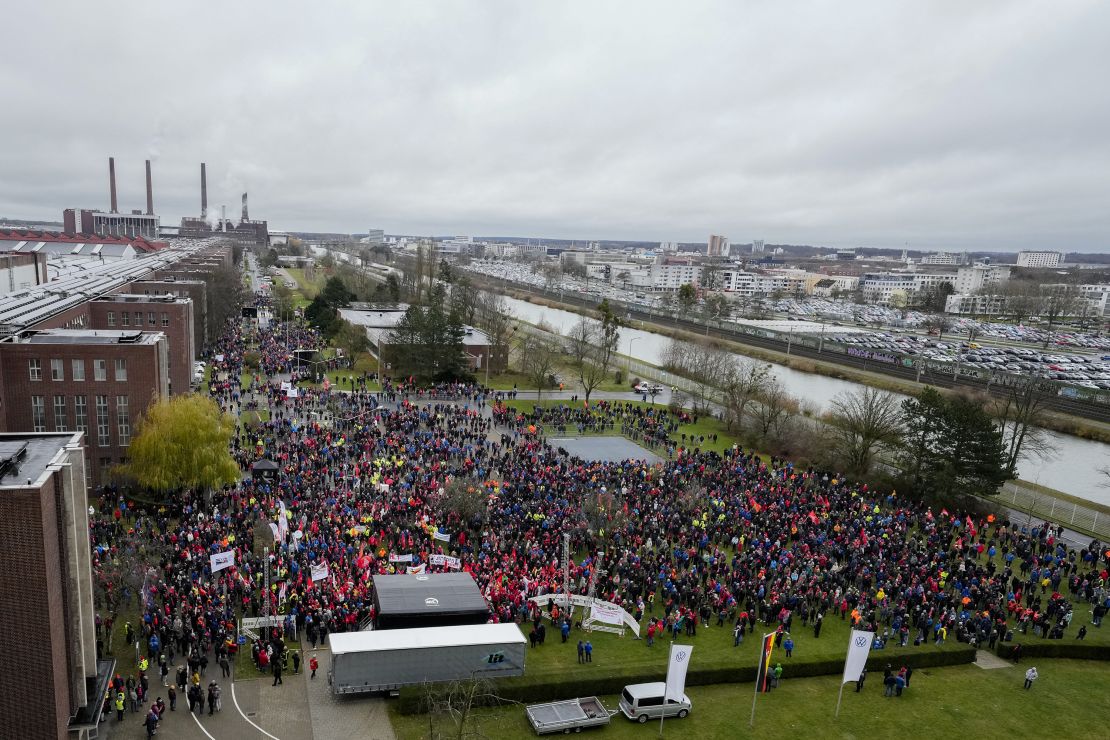Volkswagen announced sweeping changes to its German operations, including more than 35,000 future job cuts and capacity reductions in a last gasp deal between Europe’s top carmaker and unions on Friday to avert mass strikes.
The agreement was nevertheless hailed as a “Christmas miracle” by union leaders after 70 hours of grueling negotiations, the longest in the company’s 87-year history, as there would be no immediate site closures, layoffs or wage cuts.
Volkswagen has been in talks with union representatives since September over measures it says are necessary for it to compete with cheaper Chinese rivals, lackluster demand in Europe and slower-than-expected adoption of electric vehicles.
Around 100,000 workers have already staged two separate strikes in the past month, the largest in Volkswagen’s 87-year history, protesting against plans to cut wages, reduce capacity and potentially shut German plants for the first time.
“After long and intensive negotiations, the agreement is an important signal for the future viability of the Volkswagen brand,” group CEO Oliver Blume said in a statement.
VW said the deal would allow savings of 15 billion euros annually in the medium term and saw no significant impact on its 2024 guidance. It said it was looking into alternative options for its Dresden plant and repurposing the Osnabrueck site. Some production would be shifted to Mexico.
IG Metall said a 5% wage increase agreed in November would be suspended and vehicle production would shut at the Dresden plant by the end of 2025.
“No site will be closed, no one will be laid off for operational reasons and our company wage agreement will be secured for the long term,” said works council chief Daniela Cavallo.
“With this triple deal, we have achieved a rock-solid solution under the most difficult economic conditions,” she said.
The fifth round of negotiations has been under way since Monday and continued deep into the night at a hotel in Hanover this week, with negotiators only taking short breaks to sleep and fueling up on coffee, curried sausage and fruit.
Campaign Issue

An overview shows employees gather as they attend a rally of the metalworkers' union IG Metall in front of German car maker Volkswagen (VW) headquarters, during a warning strike at the company's main factory in Wolfsburg, northern Germany, on December 9, 2024.
The talks took place in a dated no-frills business hotel on the outskirts of Hanover, where delegates from both sides met in various rounds that were at times interrupted by short breaks during which they stocked up on coffee and fruit well after midnight.
Some workers even played a round of cards to decompress.
The crisis at VW has hit at a time of uncertainty and political upheaval in Europe’s largest economy, as well as wider turmoil among the region’s automakers.
How to fix Germany’s sluggish growth has taken center stage as a campaign issue ahead of a snap election in February, while Chancellor Olaf Scholz, trailing in the polls, has urged VW to keep all its factories open.
 中文
中文 English
English





